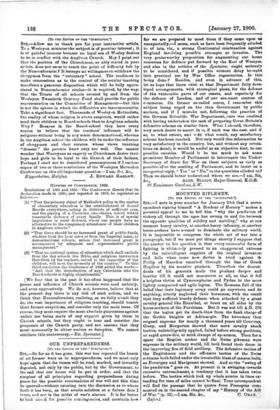OUR UNPREPAREDNESS.
[To THE EDITOR OF IRE " SFECTATOR.1 SIR,—So far as it has gone, this war has repeated the lesson of all former wars as to unpreparedness, and we must only hope again that the lesson will be read, marked, and inwardly digested, not only by the public, but by the Government, to the end that our house will be put in order, and that the simplest of all principles regarding preparedness during peace for the possible eventualities of war will not this time be ignored—without entering into the discussion as to whose fault it has been, as that awaits solution at a future date I trust, and not in the midst of war's alarms. It is far better to look ahead for possible contingencies, and ascertain bow far we are prepared to meet them if they come upon us unexpectedly,—I mean, such as have been frequently alluded to of late, viz., a strong Continental combination against England involving possible attempts at invasion. The very praiseworthy proposition for augmenting our home resources for defence put forward by the Earl of Wemyss, and also in the articles of the Spectator, ought seriously to be considered, and if possible without delay brought into practical use by War Office organisation. Is this being done P Besides, and even in advance of this, let us hope that there exist at that Department fully deve- loped arrangements, with strategical plans, for the defence of the vulnerable parts of our coasts, and especially for the defence of London, and of our sea-coast centres of commerce. On former so-called scares, I remember this subject being urged on the then Government by public acclaim, and if I mistake not, following the practice of the German Scientific War Department, ours was credited with having undertaken the task of preparing Great Britain's defensive scheme on similar lines. What I should, therefore, very much desire to ascert in is, if such was the case, and if so, to what extent, and with what result, any satisfactory scheme has been reached. Not only would this information be very satisfactory to the country, but, and without any revela- tions on detail, it would be useful as an objective hint, to our possible enemies. Would it be too much to ask some prominent Member of Parliament to interrogate the Under- Secretary of State for War on these subjects as early as possible after the meeting of Parliament, and to insist on a categorical reply, " Yes " or " No," to the questions alluded to? Then we should better understand where we are.—I am, Sir,


















































 Previous page
Previous page